There is always much to learn from quotes and their historical significance. Read on for a collection of quotes and general history from December 22nd – 28th.
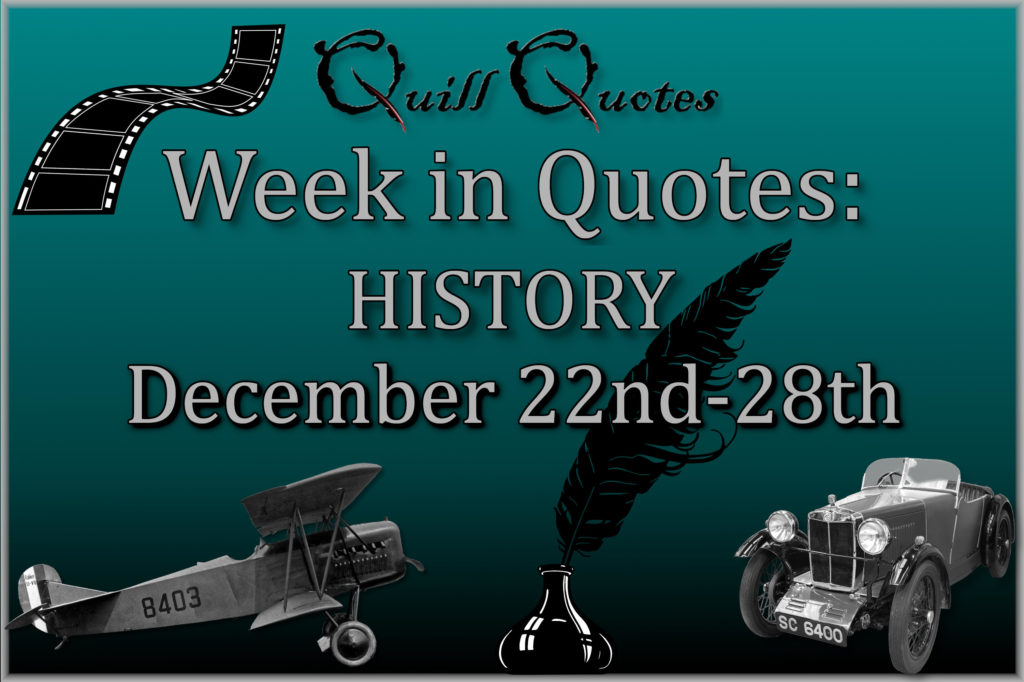
December 22, 1807
“As to the hope that it may…induce England to treat us better, I think is entirely groundless…government prohibitions do always more mischief than had been calculated; and it is not without much hesitation that a statesman should hazard to regulate the concerns of individuals as if he could do it better than themselves.”
– Secretary of the Treasury Albert Gallatin
On December 22, 1807, the United States enacted the Embargo Act as an economic sanction against all foreign nations. The embargo was particularly intended to harm the United Kingdom and France in response to their violations of U.S. neutrality during the Napoleonic Wars. While the seizure of U.S. cargo and Britain’s use of impressment, forcing thousands of British-American sailors into service in the Royal Navy, were viewed by some to be grounds for war, President Thomas Jefferson pursued economic action instead. Unfortunately, the embargo hurt the U.S. economy just as much, if not more, and was repealed on March 1, 1809. Tensions with Britain continued, eventually leading to the War of 1812.
December 23, 1952
“I had fought on behalf of man against the sea, but I realised that it had become more urgent to fight on behalf of the sea against men.”
– Alain Bombard
On December 23, 1952, Alain Bombard arrived in Barbados after sailing solo across the Atlantic to test his theory that a human could survive the trip without provisions. Bombard, a French biologist and physician, departed France on October 19, 1952, in a 15-foot (4.5 m) Zodiac inflatable boat with only a sextant and very limited provisions. He reported surviving the 66-day journey by fishing with a self-made harpoon and hooks and harvesting the surface plankton with a small net. In addition to using the fish as a source of freshwater, he also drank limited amounts of seawater. While surviving the journey proved his theory, he lost 55 pounds (25 kg) and some later claimed he took more provisions than reported, such as freshwater.
December 24, 1777
“Ambition leads me not only farther than any other man has been before me, but as far as I think it possible for man to go.”
– James Cook
Captain James Cook visited Christmas Island on Christmas Eve, December 24, 1777, giving the Pacific island its name. Now part of the Republic of Kiribati, the island is also called Kiritimati, respelling the English word “Christmas” in the Gilbertese language where “ti” is pronounced “s”. Confusingly, a different island, in the Indian Ocean, was already named Christmas Island by Captain William Mynors on Christmas Day, December 25, 1643. This one is now a territory of Australia maintaining the same name. Ironically, neither island was actually discovered near Christmas-time, both being first sighted by Europeans many years earlier. Today, both islands are of interest for their remoteness and unique wildlife.
December 25, 336
“Christmas waves a magic wand over this world, and behold, everything is softer and more beautiful.”
– Norman Vincent Peale
The first recorded Christmas was celebrated on December 25, 336, in Rome. Although celebrating the birth of Jesus Christ, his actual birthdate is unknown. Thus, December 25th was likely selected due to the Roman’s established tradition of celebrating the winter solstice on that date, particularly with early Christians connecting Jesus to the Sun, and for being 9 months after the Annunciation (March 25th) when the conception of Jesus was revealed to Mary. Today, Christmas has grown into a major economic event with many non-Christians participating in gift-giving and decorations alongside the 2.4 billion Christians worldwide. Christmas also led to the creation of Santa Claus, based on the historical Saint Nicholas, who is said to bring gifts to well-behaved children for Christmas!
December 26, 1776
A hard, howling, tossing water scene.
– David Shulman, “Washington Crossing the Delaware” sonnet
Strong tide was washing hero clean.
“How cold!” Weather stings as in anger.
O Silent night shows war ace danger!
The cold waters swashing on in rage.
Redcoats warn slow his hint engage.
When star general’s action wish’d “Go!”
He saw his ragged continentals row.
Ah, he stands – sailor crew went going.
And so this general watches rowing.
He hastens – winter again grows cold.
A wet crew gain Hessian stronghold.
George can’t lose war with’s hands in;
He’s astern – so go alight, crew, and win!
On December 26, 1776, George Washington and the Continental Army were victorious in the Battle of Trenton after crossing the Delaware River overnight. The attack on the morning after Christmas caught the Hessian auxiliaries (German mercenaries) garrisoned in Trenton, New Jersey by surprise. With only 2 Americans dead and 5 wounded, about 1,000 Hessians were captured, nearly two-thirds of the garrison! The victory came at a critical moment in the Revolutionary War, boosting morale and inspiring enlistment during the harsh winter. The event inspired many works of art, including the paintings, below, and sonnet, above! Shulman’s sonnet is particularly interesting with each line being an anagram of the title, that is, using only the letters from “Washington Crossing the Delaware”.
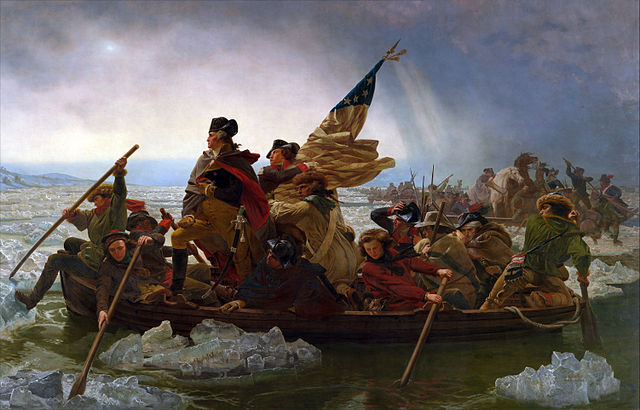
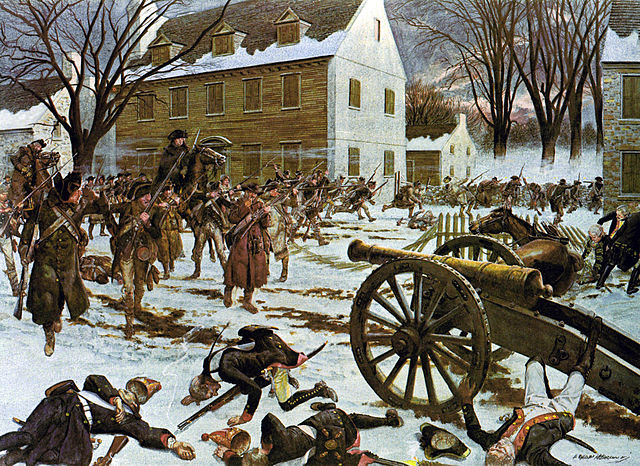
December 27, 537
“My Lord, thank you for giving me the chance to create such a worshipping place.”
– Justinian I
On December 27, 537, Byzantine Emperor Justinian I inaugurated the Hagia Sophia in Constantinople, now Istanbul, Turkey. Considered the epitome of Byzantine architecture, it’s famous for its massive dome and was the largest building in the world at the time! The church served as a Christian cathedral for much of its history before being converted into an Ottoman mosque in 1453. In fact, it was the world’s largest cathedral for that entire period, nearly a thousand years, until Seville Cathedral was completed in 1520. Hagia Sophia was converted into one of Turkey’s most-visited museums in 1935, but today, there is growing support to return the church to use as a mosque.
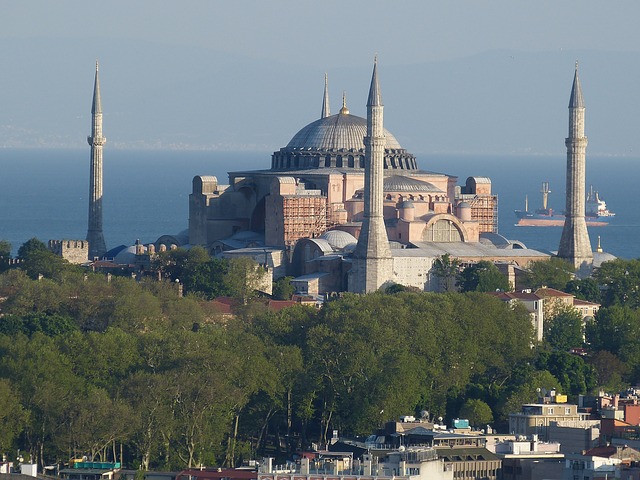
December 28, 1860
“I was the conductor of the Underground Railroad for eight years, and I can say what most conductors can’t say; I never ran my train off the track and I never lost a passenger.”
– Harriet Tubman
Harriet Tubman and a group of escaped slaves arrived in Auburn, New York on December 28, 1860, concluding her last mission to free slaves on the Underground Railroad. Following Tubman’s own escape from slavery in 1849, she returned to free approximately 70 slaves across 13 missions! Her efforts leading slaves to freedom earned her the nickname “Moses”. Later, she served as a spy for the Union Army during the Civil War and advocated for women’s suffrage. Since her death in 1913, Tubman has become an American icon for her courage and dedication to freedom.
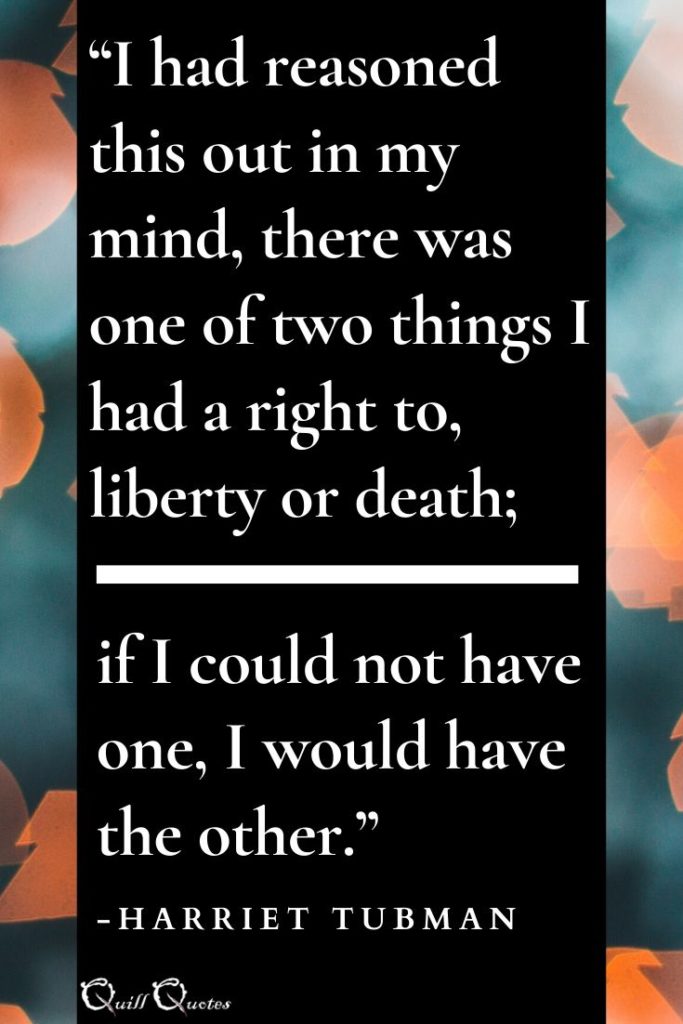
In case you missed last week’s quotes, see History December 15th – 21st.
To never miss a Quill Quotes post, please subscribe via email and/or follow us on social media!
Leave a Reply